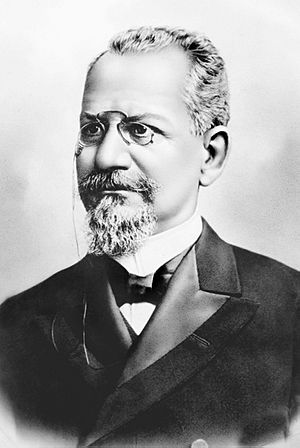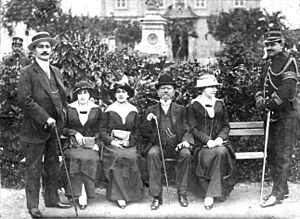Francisco de Paula Rodrigues Alves facts for kids
Quick facts for kids
Rodrigues Alves
|
|||||||||||||||||||||||||||||
|---|---|---|---|---|---|---|---|---|---|---|---|---|---|---|---|---|---|---|---|---|---|---|---|---|---|---|---|---|---|

Official portrait, 1902
|
|||||||||||||||||||||||||||||
| President of Brazil | |||||||||||||||||||||||||||||
| In office 15 November 1902 – 14 November 1906 |
|||||||||||||||||||||||||||||
| Vice President | Silviano Brandão (elect) None (1902–1903) Afonso Pena (1903–1906) |
||||||||||||||||||||||||||||
| Preceded by | Campos Sales | ||||||||||||||||||||||||||||
| Succeeded by | Afonso Pena | ||||||||||||||||||||||||||||
| President-elect of Brazil | |||||||||||||||||||||||||||||
| In role 6 July 1918 – 16 January 1919 |
|||||||||||||||||||||||||||||
| Vice President | Delfim Moreira | ||||||||||||||||||||||||||||
| Preceded by | Venceslau Brás | ||||||||||||||||||||||||||||
| Succeeded by | Delfim Moreira | ||||||||||||||||||||||||||||
|
|||||||||||||||||||||||||||||
| Personal details | |||||||||||||||||||||||||||||
| Born | 7 July 1848 Guaratinguetá, São Paulo, Empire of Brazil |
||||||||||||||||||||||||||||
| Died | 16 January 1919 (aged 70) Rio de Janeiro, Federal District, Brazil |
||||||||||||||||||||||||||||
| Political party | Conservative (before 1889) PRP (1889–1919) |
||||||||||||||||||||||||||||
| Spouse | Ana Guilhermina Borges | ||||||||||||||||||||||||||||
| Profession |
|
||||||||||||||||||||||||||||
| Signature | |||||||||||||||||||||||||||||
Francisco de Paula Rodrigues Alves (born July 7, 1848 – died January 16, 1919) was an important Brazilian politician. He first served as the leader of the Province of São Paulo in 1887. Later, he became the Treasury minister in the 1890s, managing the country's money. Rodrigues Alves was chosen as the fifth president of Brazil in 1902 and served until 1906.
During his time as president, he made big changes to Rio de Janeiro, which was the capital of Brazil back then. This period included the 1904 "Vaccine Revolt". He was elected president for a second time in 1918, but sadly passed away from the influenza pandemic before he could start his new term on January 16, 1919. His vice-president, Delfim Moreira, took over instead.
Contents
Early Life and Education
Rodrigues Alves was born in the city of Guaratinguetá, in the state of São Paulo. He studied law and became a lawyer in 1870, graduating from the Faculdade de Direito do Largo de São Francisco in São Paulo.
Beginning His Political Career
His journey in public service began early. From 1866 to 1870, he served as a councilman in his hometown. In 1870, he became a prosecutor. From 1872 to 1879, he was a member of the state house of representatives.
During the time of the Empire of Brazil, he became the president (or governor) of the province of São Paulo, serving from 1887 to 1888. After Brazil became a Republic, he helped write the country's new laws as a member of the Constitutional Assembly. He also served as a member of the house of representatives from 1891 to 1893.
Serving as Treasury Minister
Rodrigues Alves was in charge of Brazil's finances twice. He held the position of Treasury Secretary from 1891 to 1892 and again from 1894 to 1896. This role meant he managed the country's money and economy.
First Term as President of São Paulo
He returned to lead São Paulo as its state president for a second time, from May 1, 1900, to February 13, 1902. He then resigned from this role to run for the presidency of Brazil.
President of Brazil (1902-1906)
Rodrigues Alves was elected as Brazil's fifth president and served from 1902 to 1906. He was known for being a great city planner and for his skills in managing public money. He used his experience to re-plan and modernize the capital city, Rio de Janeiro.
- Modernizing Rio de Janeiro: During his presidency, Rio de Janeiro underwent major changes. Old buildings were torn down to make way for wide avenues and new public spaces. This project aimed to make the city more beautiful and healthier.
- The Vaccine Revolt: In 1904, a law was passed that made smallpox vaccination mandatory. This led to a public uprising known as the "Vaccine Revolt." People were unhappy with the government forcing them to get vaccinated, and there were protests and clashes in the streets of Rio de Janeiro.
Second Presidential Election and Passing
Rodrigues Alves ran for president again in 1918. He won the election with a huge majority, getting over 99% of the votes. He was supposed to start his new term on November 15, 1918.
However, he became very ill and was unable to take office. He passed away on January 16, 1919, due to the Spanish flu epidemic that was spreading across the world at that time. His vice-president, Delfim Moreira, became president instead.
Family Legacy
Many years later, in 1959, his grand-nephew, Carlos Alberto Alves de Carvalho Pinto, also became the president (governor) of the state of São Paulo, serving for four years.
See also
 In Spanish: Francisco de Paula Rodrigues Alves para niños
In Spanish: Francisco de Paula Rodrigues Alves para niños


